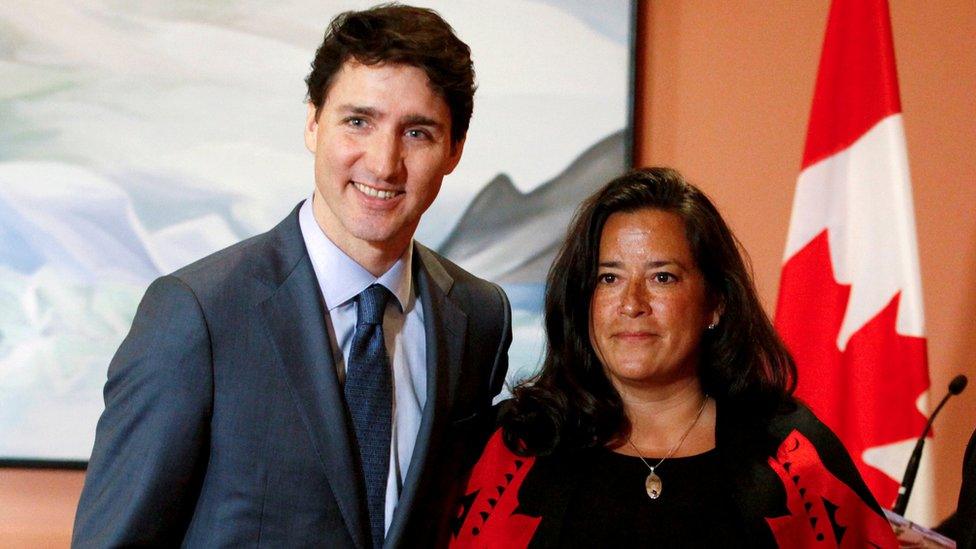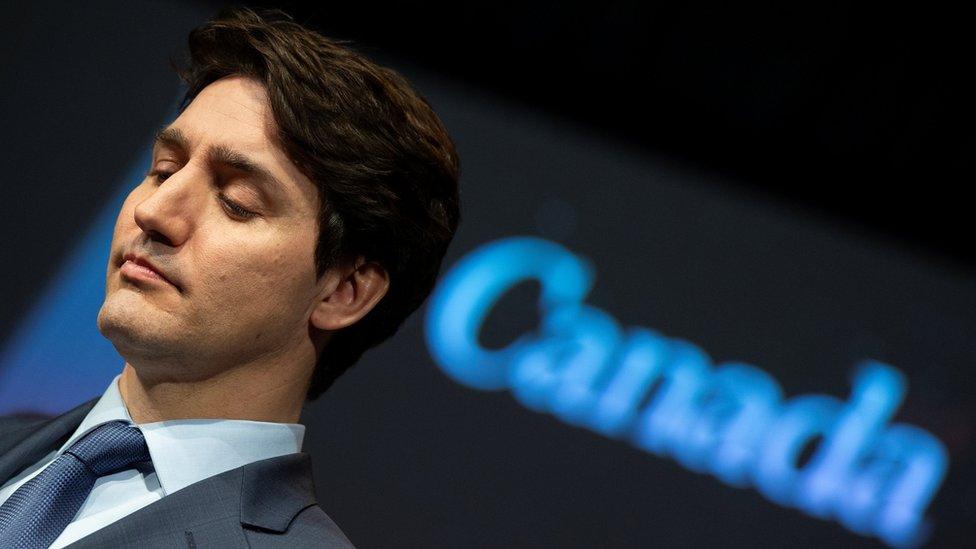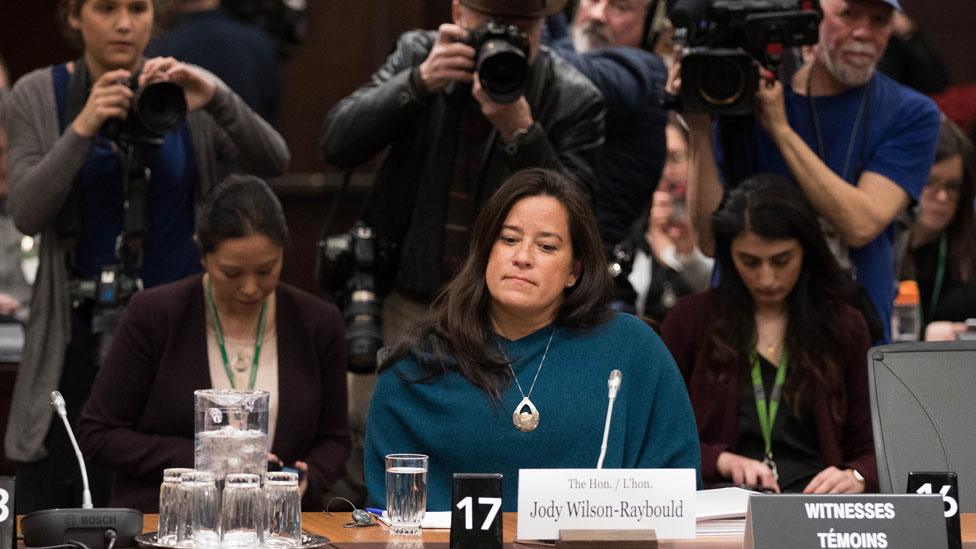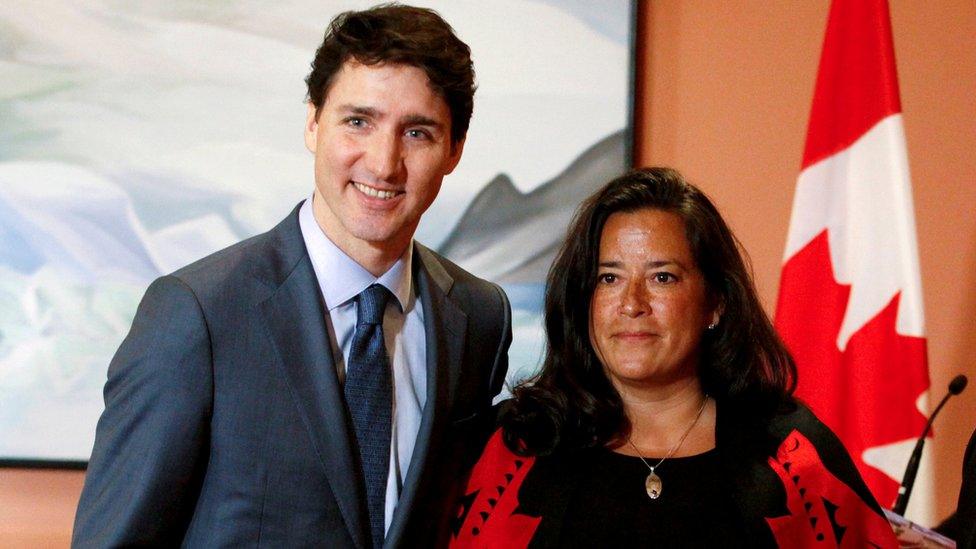Canada's Trudeau admits 'erosion of trust' in SNC-Lavalin case
- Published
'I wish she had come to me with concerns'
Canada's PM Justin Trudeau has said no inappropriate pressure was placed on a minister when he raised concerns to her about a prosecution related to one of the country's biggest firms.
But he said he should have been aware of an "erosion of trust" between the minister and his office.
Jody Wilson-Raybould says she was pressured in the criminal prosecution of engineering giant SNC-Lavalin.
Fallout from the affair has cost the prime minister two top ministers.
Mr Trudeau's statements on Thursday morning come amid a deepening political crisis for the prime minister, with numerous opinion polls suggesting that confidence in his government has taken a hit.
He admitted he had made mistakes in his handling of the matter and that "there are lessons to be learned from this situation". But he said there was no wrongdoing in the SNC-Lavalin case.
"I can repeat and reassure Canadians that there was no breakdown of our systems, of our rule of law, of the integrity of our institutions," he said.
His former attorney general and justice minister Ms Wilson-Raybould has said that she faced attempts at political interference from the prime minister and his inner circle over whether to make a deal that would have suspended prosecution against the firm.

Jody Wilson-Raybould, seen here with Prime Minister Justin Trudeau, has so far declined to comment
In those various meetings, they repeatedly raised concerns about the possibility of job losses and potential political ramifications of a trial, she said.
The Quebec-based firm is one of the world's largest engineering and construction companies.
SNC-Lavalin is facing allegations that former executives paid bribes to win contracts in Libya under Muammar Gaddafi's regime, which fell in 2011.
In Canada, the attorney general is supposed to exercise independent prosecutorial discretion, without any political interference. She resigned her cabinet position in February.
Speaking to journalists in Ottawa, Mr Trudeau said Ms Wilson-Raybould did not come to him with concerns about political pressure "and I wish she had".
He also said he never raised "partisan considerations" with the former minister.
Mr Trudeau said he and senior aides were concerned about economic ramifications of a trial.
They had pushed her to seek outside legal advice on whether SNC-Lavalin could enter into a deferred prosecution agreement.
That agreement would have allowed the firm to avoid a criminal trial and instead agree to alternative terms or conditions, like penalties or enhanced compliance measures.
A conviction could result in a decade-long ban on bidding on Canadian federal contracts, which would be a major financial blow to the firm.
Opposition parties continue to pressure on prime minister.
"The seriousness and severity of what is at stake for this country cannot be overstated," said Conservative leader Andrew Scheer on Thursday.
What has previously been said?
Speaking last week, the Ms Wilson-Raybould said late last year, she and her aides were pulled into multiple conversations and meetings - "a barrage of people hounding me and my staff" - by senior government officials and the prime minister.
She said this continued after she made the decision not to offer SNC-Lavalin an agreement.
The former attorney general said she faced attempts at interference and "veiled threats" when she refused to budge.
She said she believed no laws were broken but that the interactions crossed the line of her prosecutorial discretion.
Like the prime minister, members of his inner circle have denied any wrongdoing.
Gerald Butts, Mr Trudeau's former senior aide, said on Wednesday he only had brief and cordial discussions with Ms Wilson-Raybould with regards to SNC-Lavalin, and that the conversations were about the economic implications of the trial.
He said that it was always understood that any final decision on whether to offer SNC-Lavalin a deferred prosecution agreement was for the attorney general alone to make.
- Published28 February 2019

- Published28 February 2019

- Published13 February 2019

- Published11 February 2019
